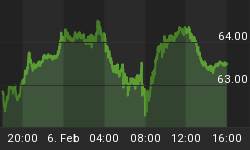Below is an excerpt from a commentary originally posted at www.speculative-investor.com on 6th October 2011.
The US economy is definitely in recession and the recession will probably extend into next year. This isn't necessarily a reason to be concerned about downside risk in the broad stock market, because the stock market attempts to discount the future and might already have priced-in the sort of earnings decline that a recession would bring about. The reason to be concerned about downside risk in the stock market is that the recession is not widely recognised and most analysts are still projecting growth in earnings over the next 12 months.
Earnings forecasts suggest that even though indicators of stock market sentiment reflected extremes of fear and/or pessimism at times over the past two months, the longer-term outlooks of most investors are too optimistic. There's a good chance that analysts' estimates and investors' expectations will be forced downward over the months ahead, leading to a sequence of declining tops in the senior stock indices.
Widespread realisation that 2012 earnings will be lower -- perhaps much lower -- than 2011 earnings could be the next shoe to drop.
While the euro-zone's sovereign debt dilemma is likely to worsen before another temporary fix is put in place, this issue is losing potency in terms of ability to adversely affect the markets. The reason is that the financial markets have been focusing on it for many months. Of particular relevance, the debt market fully discounted a Greek Government default some time ago and it would be difficult for Greece's stock market to do much worse than it has already done (for a picture of the carnage, refer to the chart displayed below). Europe's political leaders are mostly still in denial, but the financial markets have already priced-in disaster. Only the fine details of the disaster are yet to be ironed out.

Europe's crisis appears to have drawn attention away from what's happening in China. However, China has had a big influence on the global economic situation over the past few years and is likely to have a big influence over the next few years.
China is experiencing an "Austrian" boom-bust cycle writ large, with the boom phase possibly nearing its demise. The extent of mal-investment is unprecedented in modern times. The most obvious signs of this mal-investment are new cities with almost no inhabitants and massive newly-constructed shopping malls with almost no tenanted shops, but the problem runs much deeper than the unoccupied buildings. The core of the problem is that the banking industry is completely dedicated to serving the State, and as a consequence a lot of bank lending is done with total disregard for economics.
Considering that most analysts and investors believe that China is making rapid REAL economic progress and that China's economy will continue to strengthen, one of the next shoes to drop could be the general realisation that China's economy is structurally unsound.
Unlike the stark mismatch in the US between the current earnings estimates of analysts and the most likely earnings reality, we can't predict when the 'China shoe' will drop. If the US corporate earnings mismatch is going to become a major issue then it will do so within the next 9 months, but there's no telling when China's government will lose its ability to maintain the illusion of economic strength.
We aren't offering a free trial subscription at this time, but free samples of our work (excerpts from our regular commentaries) can be viewed at: http://www.speculative-investor.com/new/freesamples.html















